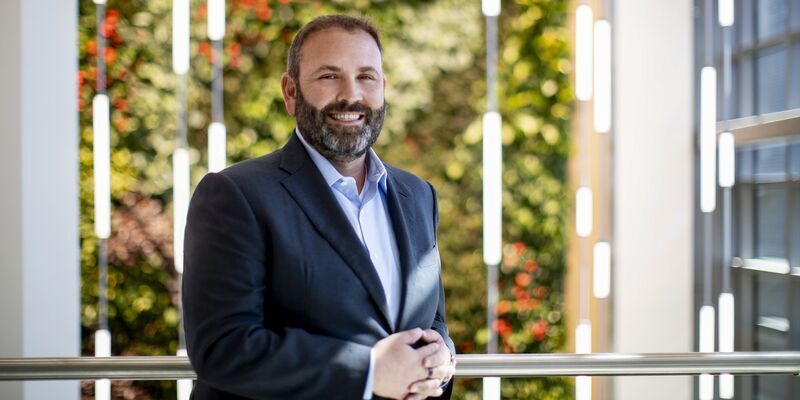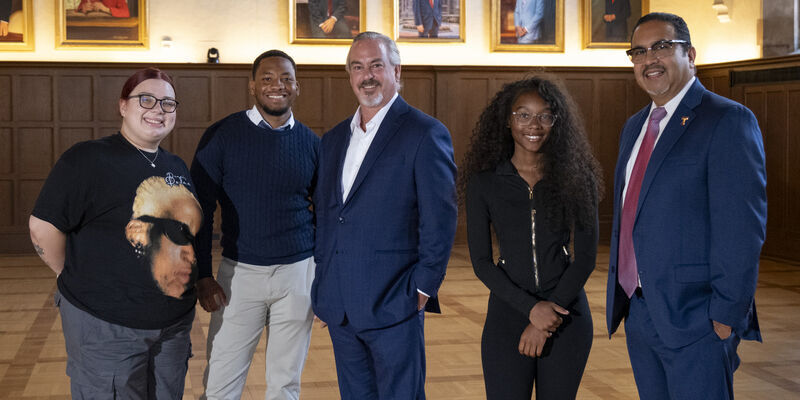Temple’s new Christopher and Julie Barnett Essential Needs Hub launches its first phase
Targeted to fully open in fall 2026, this centralized hub has begun serving the university community as staff and services moved to the new space in the lower level of the Howard Gittis Student Center.

Across the U.S., a large number of college students struggle to meet their basic needs required for well-being. A 2024 survey from Temple University’s Hope Center for Student Basic Needs showed that more than half of college students nationally reported experiencing at least one form of basic needs insecurity related to food or housing.
To address these challenges that undermine academic performance and retention, Temple has created the Christopher and Julie Barnett Essential Needs Hub, which has been named in recognition of the generosity of Christopher Barnett, CLA ’10, and his wife Julie. Barnett recently committed $55 million to Temple, the largest gift in the university’s history.
“College should be a time for discovery, growth, and opportunity. Julie and I believe that every student deserves the chance to focus on their education without the weight of basic needs insecurity holding them back,” remarked Barnett. “Our hope is that this space becomes more than just a resource center, but that it becomes a symbol of what’s possible when a university chooses to invest in the whole student. Because when students are supported, they do more than just change their own lives; they go on to change the world.”
This comprehensive and centralized center integrates services and resources such as food, housing, clothing, transportation security, mental health support, benefits navigation, case management and emergency and legal aid.
“The Christopher and Julie Barnett Essential Needs Hub represents a transformational step for Temple,” said Jodi Bailey Accavallo, vice president for student affairs. “By creating a coordinated system, we remove barriers before they derail a student’s journey. The hub is a visible commitment to our mission of access and excellence and ensures that every student, regardless of circumstance, can fully engage in their education and thrive here.
“Offering this hub affirms that Temple not only educates students in the classroom, but also supports their whole lives, aligning with our goals of retention, success and belonging,” she added.
The naming of this hub is the latest example of Barnett’s philanthropic legacy in the area of student needs. He previously supported the university’s on-campus food pantry, now known as the Barnett Irvine Cherry Pantry. When the hub fully opens in fall 2026, the pantry will move to this space and expand its offerings to hygiene and pharmacy items and products.
On Oct. 10, the Christopher and Julie Barnett Essential Needs Hub launched its first phase, which entailed opening classroom and programming space and moving staff from Case Management and Crisis Services, Community Benefits Navigation, and Off-campus Living Support to the lower level of the Howard Gittis Student Center.
“We want to build awareness now about what will be available to students so that they feel comfortable and confident accessing these resources,” said Deanne DeCrescenzo, assistant vice president of student advocacy and engagement in the Division of Student Affairs.
In collaboration with campus units like the Health and Well-being Division, Student Financial Services and the Career Center, the hub would like to provide immunization clinics, tax preparation, FAFSA workshops and wellness events.
Additionally, once completed, the Christopher and Julie Barnett Essential Needs Hub aims to have a Temple Thrift storefront, a bike repair shop and distribution center, a satellite location for the Resiliency Resource Center, decompression and sensory spaces and technology access and charging stations.
“We’re proud to be leading the way in offering a comprehensive essential needs center that centralizes resources and is designed to directly support student success,” said DeCrescenzo. “We’re committed to this collaborative and proactive model that will fill in the gaps for our students because all students deserve the support needed to succeed at Temple.”


